| Srl | Item |
| 1 |
ID:
087471
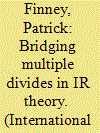

|
|
|
| 2 |
ID:
087473


|
|
|
| 3 |
ID:
087470
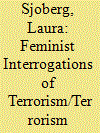

|
|
|
| 4 |
ID:
087472


|
|
|
| 5 |
ID:
087475
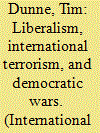

|
|
|
| 6 |
ID:
087467


|
|
|
| 7 |
ID:
087468


|
|
|
| 8 |
ID:
087457
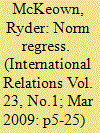

|
|
|
|
|
| Publication |
2009.
|
| Summary/Abstract |
Is the norm against torture suffering a crisis of legitimacy within the United States, and if so, does this constitute a crisis in the norm itself? Can constructivist international relations theory explain how the norm came to be significantly weakened by its most important proponent? Constructivist literature on norms has hitherto suffered from a `nice norm bias' that does not adequately take into account the reversibility of so-called `internalized' norms like the one prohibiting torture. Through an examination of the rhetoric, policies and practices surrounding US interrogation after 9/11, this article addresses omissions in constructivist literature by providing a theoretical model to explain `norm regress', or the death of norms. It claims that the torture norm is suffering a crisis of legitimacy within the United States and any future incidences of torture by liberal states may well bring about a crisis of legitimacy in the international norm itself.
|
|
|
|
|
|
|
|
|
|
|
|
|
|
|
|
| 9 |
ID:
087474
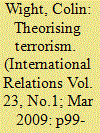

|
|
|
| 10 |
ID:
087459
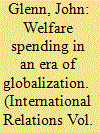

|
|
|
|
|
| Publication |
2009.
|
| Summary/Abstract |
This paper examines the assertion that economic globalization has led to the decline of welfare spending in recent decades. Although it is often argued that the increasing intensity of globalization has led to such a decline in the industrialized states, the paper finds that there has been little, if any, downturn in either levels of state expenditure in general or in levels of welfare spending in particular. However, the experience of the developing states has been rather different. In their case, the last few decades indicate that stagnation or a decline in welfare spending has occurred, particularly during the period of structural adjustment implementation. It is argued that the OECD countries still manage to provide a high level of social welfare to their populations that closely resembles the compensatory state model. In contradistinction, many of the states in the South have struggled to maintain their levels of social expenditure and therefore most resemble Cerny's competitive state model. In order to explain these two divergent outcomes, the paper examines the way in which the behaviour of certain key international financial actors (investors, multinational companies, international financial institutions) differs with regard to these two sets of countries.
|
|
|
|
|
|
|
|
|
|
|
|
|
|
|
|